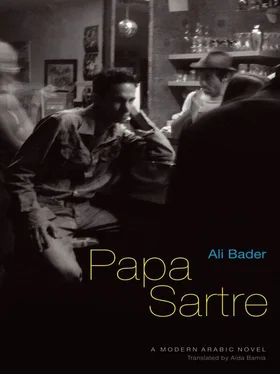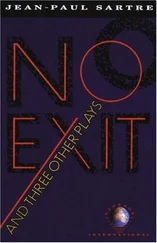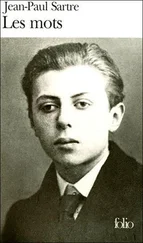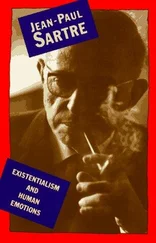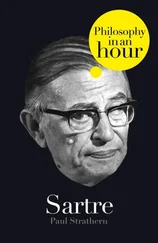26
They left the bar totally drunk and were met at the door by a Filipino prostitute. When the philosopher smiled at her, she turned to him and opened her coat, revealing a short skirt, dark thighs, and provocative breasts. He asked if she would accompany him to his apartment, and she said yes. She walked with the two men until Ahmad went off on his own. The two friends agreed to meet the following day at noon.
27
Abd al-Rahman and the prostitute returned to his apartment under a heavy rain that was soaking into Paris. The rain didn’t stop all night, and the streets filled with puddles that shone like pieces of glass under cars’ headlights. The philosopher was in the habit of going home drunk every night after spending hours in bars drinking and talking, eventually leaving with a different prostitute each night. This was his way of fighting his loneliness and isolation. His anger at others and his swearing were not deliberate insults but an expression of noble desperation. He was suffering, and in his condition his only consolation was his belief that philosophy can be attained only through suffering, pain, and tragedy.
The afternoons passed quickly during the Parisian winters, but the nights were like a wet and icy nightmare. To overcome his anguish Abd al-Rahman had nowhere to go but the bars and bordellos. Every now and then he spent time quarreling with his friend Ahmad, an Iraqi who had come to Paris to study engineering but never got a degree. He survived in the French capital through the largesse of rich Iraqis, for whom he did small favors in exchange for cigarettes, a drink, or a sandwich. He would always return drunk to his hotel room in Porte d’Italie, enter his cold room, lie down on his bed, cover himself with a damp blanket, and drop off to sleep.
28
The following morning the sun made its appearance between the clouds, warming up a wet Paris day that was still filled with the previous night’s rain. Ahmad pushed at the door of Apartment 13 in one of Gay-Lussac’s buildings just as the Filipino prostitute was rushing out without makeup and carrying her evening clothes. He gave his friend, who was still in bed, the morning papers: Le Monde, Le Figaro , and Libération . This ritual was followed by breakfast, which Ahmad habitually prepared for the two of them.
After skimming the papers, the philosopher took a shower and prepared himself for the activities of the new day. He wanted to know what plans had been laid for meeting Si Muammar, a scheme that would protect his pride and dignity as a philosopher. Ahmad pressed for an informal encounter, explaining that the matter was not worth formalities. He spent a great deal of time with the Algerians and knew them well, so he advised Abd al-Rahman simply to ask Si Muammar about conditions in Algeria as an overture to their conversation. The philosopher objected, clearly unhappy with Ahmad’s suggestion. He insisted on meeting him in a “philosophical manner.”
“I’ve learned that he has an Algerian girlfriend and an Iraqi friend named Nader,” explained Ahmad.
“He’s a crook then — an Algerian girlfriend. He’s a crook,” commented Abd al-Rahman, laughing victoriously and clapping. He continued, “Despite all this I want to meet him in a special way. I want to humiliate him, to crush him from the first moment. You want me to go and tell him that I wish to become acquainted with him? Impossible!”
He fell into a reflective mood, trying to think. In truth, the philosopher was unable to think during crucial moments; instead he dreamed in his own philosophical way. He wondered aloud why his friend wasn’t thinking like he was, in a philosophical manner. Surprised, Ahmad was quick to explain, “Because you’re the philosopher, not me.”
Abd al-Rahman was trying to think of a dignified way to meet his rival, an arrangement worthy of his social and philosophical rank. He didn’t want to stoop to the level of the common people and the pseudo-philosophers to reach his aim. After some deliberation he came up with an approach that Ahmad had suggested previously but which he had rejected. He presented the same idea in a slightly different way so as not to appear to contradict himself: “We can go to the Latin Quarter and have you ask the Iraqi philosopher to discuss some of Sartre’s ideas with Si Muammar.”
Ahmad expressed his huge admiration for the suggestion. He knew the philosopher could not stand to have anyone contradict him, even in simple matters, like many young people of his generation. As far as Abd al-Rahman was concerned, disagreeing with him meant failing to recognize his genius. This would lead the philosopher to cross that friend off his list, insult him, and even resort to physical assault. Ahmad, however, could not afford to lose the friendship and approval of a supporter. He was neither a philosopher nor a politician and barely a human being. All he wanted was to stay alive, even if it meant surviving, like cats and dogs, on the master’s scraps. He was willing to go along with Abd al-Rahman’s mistakes, accept them without argument, and humbly accept blame for the philosopher’s failures, and beg for forgiveness.
The two men left the Gay-Lussac apartment around noon in search of Si Muammar. The philosopher now considered Muammar a disturbed man and a drug addict, who was loose, adventurous, lustful, and destructive. Making his way through the crowds, Abd al-Rahman felt distant and alone, a sentiment that provided him with a sense of strength. He walked firmly and forcefully, his face pale and his nose red from the cold. A light wind teased women’s hair as they walked laughing, carrying their books. He overheard snatches of love stories, philosophical discussions, and political debates as he moved between the patrons of sidewalk cafés and restaurants. He heard music, noticed the window displays of bookstores, and saw the huge selection of flowers arrayed in beautiful containers. They passed cigarette and newspaper kiosks, telephone booths, and souvenir shops along the way.
Abd al-Rahman followed behind Ahmad, who was searching for Si Muammar in the cafés along their route until they found him sitting with some of his Algerian friends and Nader, the Iraqi. Relieved, he pointed him out to Abd al-Rahman. Si Muammar’s profile looked like that of a typical Algerian — thin, pug-nosed, with a skillfully shaped mustache over a delicate mouth. He had curly hair with some graying and was balding slightly.
The two friends sat at a nearby table. As soon as the philosopher looked closely at Si Muammar he panicked. His heart began pounding and his hands trembled, his eyes turned red and teary and he started panting. He whispered to Ahmad, “What are we doing here?” Nonplussed, Ahmad didn’t know what to say and looked at the philosopher with his mouth agape. When he heard him say, “Let’s go,” Ahmad objected, “After coming all this way?!” The philosopher grew confused and fearful, but agreed to stay in order “to rest a little.”
The situation revealed Abd al-Rahman’s weak character, but why would a philosopher need a strong personality? It’s his mental acuity, strong philosophical background, and vision that count. A personality is shaped by external factors and social and economic conditions. Philosophy needs an inner hunch, a certain premonition about the destruction of the external world that causes the philosopher to shun the outside world, despise it, and ignore it. Abd al-Rahman’s personality was shaped from the inside, and from this inner structure came the strength of his ideas and concepts, but it also made him more fearful of others. His introverted nature hindered his interaction with women, yet he was grateful for a weakness that protected him from acting foolishly, like the homeless sleeping in metro stations, the drunkards in the bars, and the beggars on the sidewalks who were adventurous and paid the price for it. Sudden bouts of courage often placed him in ridiculous situations that he greatly regretted.
Читать дальше
